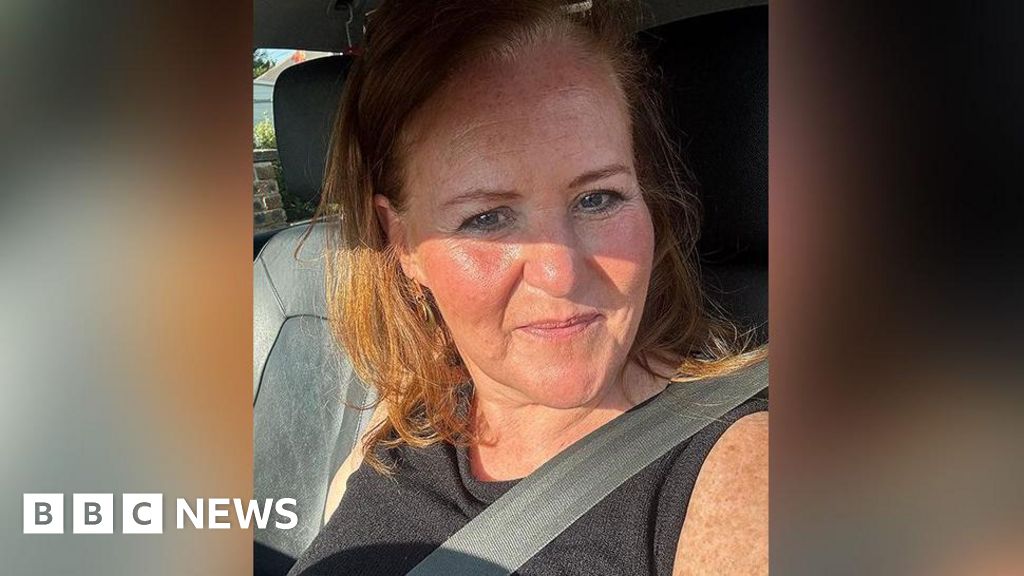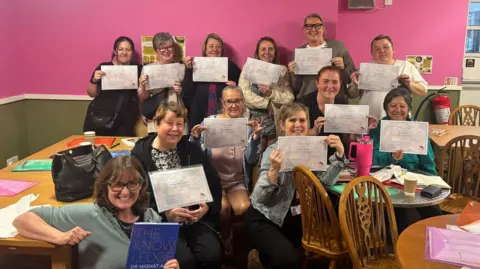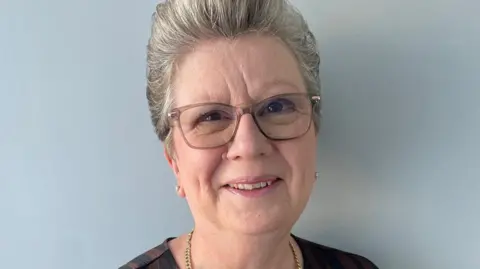
‘I thought I was losing my mind but it was the menopause’
Lynette HorsburghNorth West
 Leonie Painter
Leonie PainterA woman has described how she quit her job after she thought she was “losing her mind” while she was suffering loneliness, anxiety and confusion which turned out to be symptoms of menopause.
Leonie Painter from Moston in Manchester said she did not know why she felt that way and did not think she could talk to others about it when the symptoms began to develop after the Covid pandemic.
The 50-year-old said: “It was only after learning what was causing it that I began to feel better, but it’s taken a long time to get to this point.”
Following her experience, she started a group for women going through menopause that has come to be described as a “lifeline” by those who attend.
The sessions started in September 2024 at the Harpurhey Neighbourhood Centre, and were originally set up as a 12-session menopause group.
Ms Painter said the aim was to break the stigma around menopause by giving women a space to talk and discuss subjects such as “brain fog” with others who understand, to increase their knowledge of perimenopause and menopause, and bust myths.
It has proved so successful it is now a weekly community group funded by the Winning Hearts and Minds initiative under Manchester City Council and Jigsaw Housing which provides targeted community-based funding.
Ms Painter said her experiences meant she knew how important it was to break the stigma around menopause and empower women by giving them a safe space to talk.
She said the hub’s message was “menopause doesn’t mean your life is ending, it’s a new chapter”.
 North Manchester menopause hub
North Manchester menopause hubLiza Davies, from Collyhurst, Manchester, said the hub has been a “lifeline” for her.
She suffered the most challenging period of her life from September 2024, and said she felt like taking her own life “most days” as well as being “agitated and angry but could not understand why”.
The 46-year-old said: “I was overwhelmed, confused, and felt like I was losing my mind.
“The physical symptoms were relentless, and the emotional toll was even harder to explain.”
“It truly saved me,” she said, adding it enabled her to not only manage her symptoms but move “from surviving to thriving”.
Liza said the hub “offered clarity, compassion, and connection when I needed it most”.
She said “I found a community that understood me, resources that empowered me, and support that made me feel less alone.”
Liza said: “I am not 100% there yet but I have come a long way.
“I have started to rebuild my life and with time, patience and the support of Leonie and the group I will get there.”
Liza has trained as a “menopause champion”, supporting others “going through this journey” and helping “break the silence around menopause”.
“It creates a space where people feel seen, heard, and validated.
“It truly saved me and now I’m committed to helping it save others,” she said.
 Deena Banister
Deena BanisterDeena Banister, from New Moston, Manchester, joined the hub – which offers expert talks covering everything from symptoms and HRT, to bone health, lifestyle and mindfulness – almost a year ago when her GP suggested it after struggling with severe symptoms.
The 60-year-old said the “difference for me has been astounding”.
“I left my job because I thought I had serious health issues linked to menopause symptoms,” she said.
“My confidence had taken a knock and unknowingly I was suffering depression and high anxiety.”
She said the group has given her “vital information and support” and connections with mental health and physical health practitioners.
“I have received the correct medication for my menopause and mental health issues, I have joined a small gym run by the hub leader and I’m now investing in myself.
“My strength and confidence have been boosted and my understanding of what is happening to my body and mind has improved dramatically.”
She has also become a “menopause champion” and passes on what she has learned to others.
Deena said: “The hub is so important because it gives correct, up-to-date information, establishes important links with medical and mental health services, and improves the lives of women.”
The NHS Greater Manchester Integrated Care is hoping the menopause hub model will now extend across Manchester and beyond.
First Appeared on
Source link







